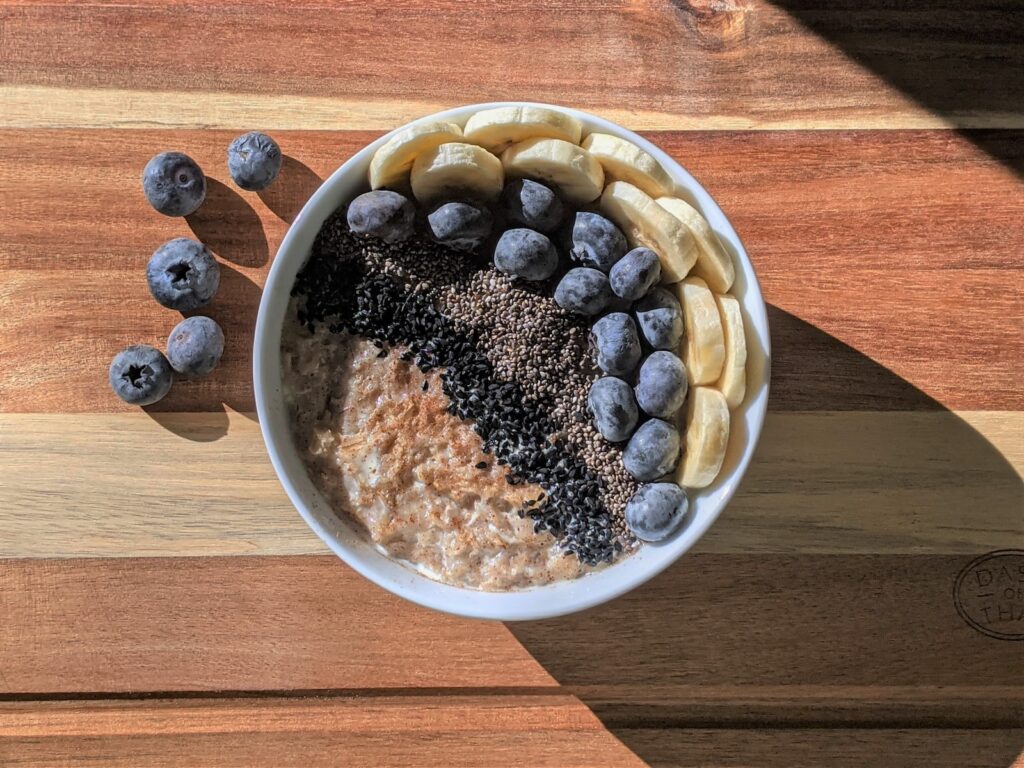Introduction
A Seed on the Rise
Chia seeds have taken the health world by storm, emerging from obscurity to become a staple in the diet of those looking to shed pounds. At HealthandSurvival, we’ve seen the trend rise firsthand, with more people turning to these tiny seeds for a big health boost. But what is it about chia that’s capturing the attention of the weight-conscious crowd?
A Glimpse into History
Chia seeds aren’t new to the scene. They’re part of an ancient legacy, revered by the Aztecs and Mayans for their ability to provide sustained energy. Today, they’re not just an energy booster but a recommended addition to a weight loss diet, thanks to their rich nutritional profile.
The Core Argument
At HealthandSurvival, we advocate for the power of chia seeds in aiding weight loss. Scientific research backs the idea that a specific daily amount of chia can be beneficial. But how many tablespoons are ideal? This article will delve into that question, offering insights from nutritional experts and grounding our discussion in the latest research.
The Nutritional Profile of Chia Seeds

A Treasure Trove of Nutrients
Chia seeds, derived from the Salvia Hispanica plant, are a testament to the phrase “good things come in tiny packages.” These small seeds are a great source of nutrients, offering a robust combination of fiber, protein, and omega-3 fatty acids. At HealthandSurvival, we often highlight that adding chia seeds to your daily regimen is like unlocking a treasure chest of nutrition for your body.
The Power of Fiber and Protein
The fiber and protein in chia seeds work in tandem to promote satiety and aid digestion, making them a fantastic addition to your weight loss diet. Chia seeds have a unique ability to absorb liquid and swell, which can help you avoid overeating at meal times. This property also makes chia seed water or pudding a filling, low-calorie option for those looking to lose weight without feeling deprived.
Omega-3: The Heart of the Matter
Chia seeds are rich in omega-3 fatty acids, known for their heart-health benefits. These fats are essential, meaning your body can’t produce them, and they must be obtained through your diet. Chia seeds could be your fitness ally, providing these vital acids that promote heart health and potentially aid in managing body fat.
Adding Chia Seeds to Your Routine
Eating chia seeds is a practice as old as the ancient Aztec and Mayan cultures, but it’s just as relevant in today’s fitness and health news. You can add them to smoothies for a nutrient-packed breakfast or sprinkle ground chia seeds over a salad for a crunchy texture. The morning can be the perfect time to integrate chia seeds with your breakfast, setting a positive tone for nutrition throughout the day.
Versatility in Weight Management
Chia seeds can be added to virtually any food, from baked goods to yogurt, making them a versatile component in a weight loss journey. Whether you’re making a healthy chia seed pudding or simply adding chia seeds to your oatmeal, these seeds will provide the nutritional benefits you need to support your fitness goals.
At HealthandSurvival, we understand that every calorie and nutrient intake counts when you’re aiming to shed pounds. Chia seeds offer a low-calorie yet high-nutritional return, ensuring that you can make the most of every meal without adding empty calories. They’re not just a superfood; they’re a smart food choice for anyone looking to enhance their health regimen.
Understanding Weight Loss Basics
The Role of Chia Seeds in Diet
When you eat chia seeds, you’re not just consuming a food item; you’re adding a health supplement to your diet. The weight loss benefits of chia seeds are well-documented, with studies showing that the consumption of chia can cause a feeling of fullness that lasts for hours, reducing the urge to snack and helping to control calorie intake. However, it’s important to note that your diet is more than just the sum of its parts—it’s about balance and nutrition.
Managing Caloric Intake with Chia
Adding chia seeds to your diet is a strategic move for those looking to lose weight. At HealthandSurvival, we often share that two tablespoons per day, soaked in water, can significantly increase the fiber content of your diet, which helps maintain a healthy stomach and avoid bloating. This practice can also mitigate the risk of overeating by making you feel full longer.
Nutritional Benefits Beyond Weight Loss
Chia seeds chia seeds are not only about aiding weight loss. They’re a good source of healthy fats, including omega-3 fatty acids, which are beneficial for maintaining healthy skin and reducing the risk of chronic diseases such as heart pressure problems and diabetes. The seeds also contain vitamins and minerals such as calcium, which are essential for bone health.
The Importance of Hydration
Chia seeds can absorb a lot of water, which is why it’s crucial to consume them with plenty of liquids. This absorption can help maintain hydration levels, but if not consumed properly, seeds can cause discomfort or bloating. Therefore, it’s recommended to soak them in water before adding chia seeds to your juices, smoothies, or other recipes.
A Note on Side Effects
While chia seeds are generally safe and healthy, they can have side effects if not consumed in moderation. Consuming chia seeds along with a sufficient amount of water helps to mitigate these effects. However, people with swallowing difficulties or those at risk of hypoglycemia should be cautious and consult a healthcare provider before making chia seeds a regular part of their diet.
Medically Reviewed Advice
At HealthandSurvival, all our health tips, including those on using chia seeds for weight loss, are medically reviewed by experts. We ensure that the information we publish is not only helpful but also safe for our readers. We love chia seeds for their versatility and health benefits, and we encourage our readers to explore the various ways to incorporate chia seeds into a balanced diet. However, we it is of utmost importance that you consult your physician before trying anything mentioned on our website.
Chia Seeds and Metabolism
Boosting Metabolism with Chia
Chia seeds are an excellent source of plant-based nutrients that can aid weight loss and enhance metabolism. The high fiber content chia seeds possess is crucial for maintaining stable blood sugar levels, which is vital for a healthy metabolism. A study published in the “Journal of Food Science and Technology” suggests that the alpha-linolenic acid (ALA) found in chia seeds may help improve metabolic health, reducing the risk of metabolic syndrome, which is often a precursor to diabetes.
The Antioxidant Profile
Chia seeds are also rich in antioxidants, which not only protect the body from free radicals but also support metabolic health. These tiny seeds are packed with fiber and protein, which can help promote digestion and prevent the sluggishness often associated with a slow metabolism.
Recommended Daily Intake of Chia Seeds
How Much Chia to Eat
The recommended daily intake of chia seeds varies, but a common guideline is two tablespoons per day. This amount provides a significant portion of the daily fiber and omega fatty acid needs without adding excess calories. It’s important to start with a small serving size of chia and increase gradually to avoid digestive issues like bloating or constipation.
Incorporating Chia Seeds into Your Diet
Versatile Seed for Any Meal
Chia seeds can be easily added to your diet in a variety of ways. You can sprinkle chia seeds on salads, add them to smoothies, or mix them into yogurt. Soaked chia seeds can also be used to make chia pudding, a popular and delicious breakfast option. For a quick snack, try adding chia seeds to your oatmeal or homemade energy bars.
Recipes to Try
HealthandSurvival recommends trying chia seed pudding made by soaking the seeds overnight in almond milk, then topping with fresh fruits and nuts in the morning. This not only makes a nutritious and filling breakfast but also ensures you start your day with a meal rich in vitamins and minerals.
Exercise and Chia Seeds for Optimal Weight Loss
The Best Time to Consume Chia
Consuming chia seeds before or after a workout can provide the energy boost needed for an effective exercise session. The best time to consume chia seeds is about 30 minutes before your exercise to allow the seeds to absorb water and create a gel, which helps you feel full and may prevent overeating after working out.
Pairing with Exercise
Exercise is a critical component of any weight loss plan. Chia seeds, with their high protein content and essential fats, can support muscle building and recovery. Adding a tablespoon of chia seeds to a post-workout smoothie can help in muscle repair and growth.
Read: Pumpkin Pie Nutrition Facts: A Comprehensive Look
Monitoring Your Progress
Keeping Track with Chia
Monitoring your weight loss is essential when incorporating new foods like chia seeds into your diet. Keep a food diary to track the amount of chia seeds consumed and note any changes in weight or how you feel throughout the day. This will help you understand the impact of chia seeds on your weight loss journey.
Adjusting Your Intake
As you monitor your progress, you may find that adjusting the amount of chia seeds you consume is necessary. While chia seeds are beneficial, consuming them in moderation is key, as too much fiber can lead to digestive discomfort.
In summary, chia seeds can be a valuable addition to a weight loss diet, offering benefits that range from improved metabolism to enhanced satiety. They are a nutrient-dense food that can support your health goals when used correctly. Remember to consult with your doctor before making any significant changes to your diet, especially if you have existing health conditions.
Additional Considerations
Counterarguments and Balanced Diets
While chia seeds are celebrated for their health benefits, it’s essential to address the counterarguments head-on. Claims about superfoods like chia seeds often create a trend that overshadows the importance of a balanced diet. At HealthandSurvival, we believe that no single food can guarantee weight loss or health improvements. It’s the synergy of a well-rounded diet and lifestyle management that leads to sustainable health outcomes.
The Socio-Economic and Environmental Impact
Chia seeds come from the Salvia hispanica plant, native to Mexico and Guatemala, and have become a trending topic in wellness circles. However, the popularity of chia seeds has socio-economic and environmental implications. The increased demand can lead to over-cultivation, which may affect biodiversity. Consumers should be aware of these factors and strive to source chia seeds from responsible suppliers.
Cultural Resurgence and Modern Diets
The use of chia seeds is not a new phenomenon. These seeds were used by ancient cultures for their robust nutrient profile, and today, they have been rediscovered as a functional food. This cultural resurgence reflects a broader trend of incorporating ancient wisdom into modern health practices.
HealthandSurvival’s Commitment to Evidence-Based Information
At HealthandSurvival, we emphasize the importance of evidence-based dietary choices. Our articles and tips are backed by scientific research and reviewed by dietitians to ensure accuracy. We guide our readers through the noise of health trends with facts and practical advice.
Unique Angles for a Holistic Approach
In discussing chia seeds and their role in weight loss, we also explore unique angles such as their potential to reduce the risk of heart disease and cancer, thanks to their high antioxidant content. Chia seeds are also an excellent source of plant-based omega fatty acids, which are essential for overall health.
Conclusion
In conclusion, chia seeds are a good source of fiber, protein, and omega fatty acids, which can aid weight loss and support a healthy lifestyle. However, they should be consumed as part of a diverse diet. We encourage our readers to consult with healthcare providers before making significant changes to their diet and to consider the broader implications of their food choices.
Read: 20+ Banana Bread Recipes
We invite you to follow us on social media for more insights into health and survival in the modern age. Sign up for our newsletter to stay updated on the latest health trends and discoveries. And remember, the journey to wellness is a marathon, not a sprint. Start incorporating chia seeds into your diet today and take a step towards better health.

